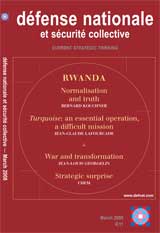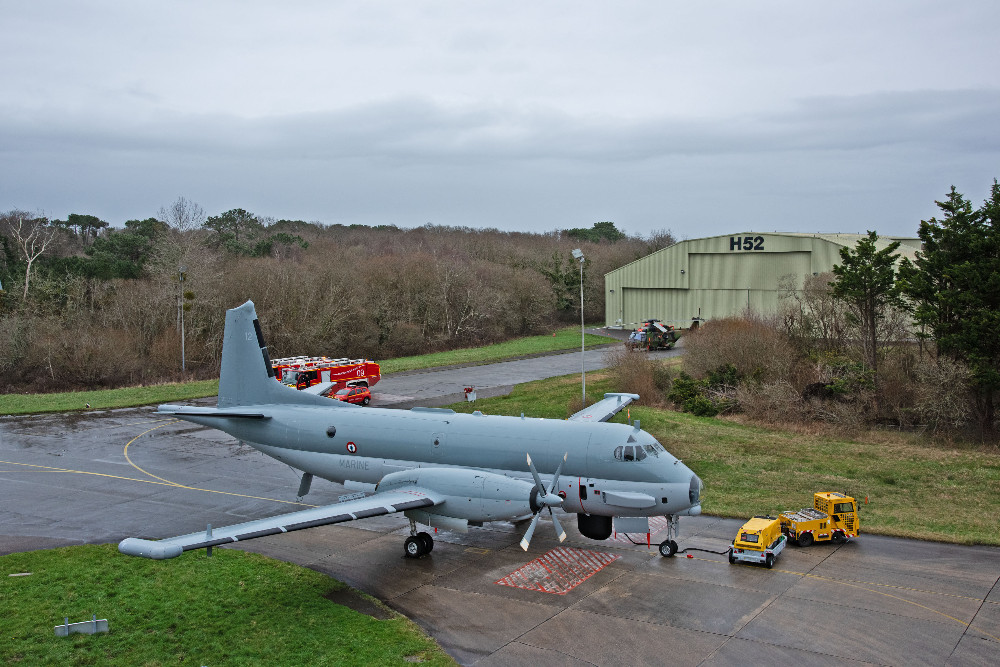Edition anglaise

March 2008 - n° 706
Normalisation and truth - Bernard Kouchner
Although France probably committed political errors in Rwanda and was for a long time mistaken about the nature and causes of the crisis, it in no way took part in the genocide against the Tutsis. But the accusations made against us and against our army are extremely serious. We must therefore shed full light on the Rwandan tragedy so as to restore normal relations with this country based on trust. That is what the French government is working towards.
Turquoise: an essential operation, a difficult mission - Jean-Claude Lafourcade
The recent evolution in Franco-Rwandan relations has brought Operation Turquoise back into the spotlight. As the realities of that operation are little known and often misrepresented, it seems useful to give my account of what happened by its commander, someone who was directly concerned, faced with a difficult mission against which some serious accusations have been made.
The lessons of Chad for Europe - Jean-Dominique Giuliani
In this editorial by the Chairman of the Robert Schuman Foundation the author stresses the merit of France’s actions in Chad carried out on behalf of Europe, and castigates those who have denigrated it.
War and transformation - Jean-Louis Georgelin
Successful transformation of our forces means firstly taking note of the transformation that is taking place in war itself and the challenges that this represents for our armed forces. This requires an overall approach to our defence capability, drawing conclusions from the continuity between operations, the development of military capabilities and the administration of the forces (extracts from a speech by the Chief of the French Defence Staff, General Jean-Louis Georgelin, on opening the colloquium ‘Europe and Transformation’ on 5 February 2008; www.defense.gouv.fr/ema).
Perspectives 2008 - Jérôme Pellistrandi
Just a few weeks from publication of the White Paper that will set out the road map of France’s defence for the coming decade, it is useful to explore several avenues of thought on what is the increasingly complex strategic situation in the world, in which the centre of gravity has shifted towards Asia and where, in an arc of crisis from the Atlantic to the Indian Ocean, the United States is powerless and Europe absent. The European dimension of French defence, however, has some important assets, and 2008 could turn out to be an interesting year.
Strategic surprise - CHEM
Understood as an intentional event, more or less unexpected, affecting the State’s defence and security, strategic surprise is never so close as when certain conditions all obtain: failure to identify weak signals; an analytical capability restrained by a predetermined way of thinking that virtually excludes other rationalities; lack of moral preparation among the decision-makers and the population; and rigidity of national organisation. France will only be able to anticipate surprise and regain the initiative if it restores a certain strategic depth. We need to do three things now: inform the authorities and forge national cohesion, reestablish some depth in our strategic analysis, and bolster our capability for decision and action.
Subcontinental states: a look ahead - Roberto Nayberg
Having analysed ‘subcontinental states’ (the BRIC countries and the United States) in a previous article, in terms of their relative power in the past, here the author looks ahead, until 2050, again comparing them with France. This very cautious approach brings out changes in the balance of power, calculated using a composite indicator of power, but also the relatively unchanging hierarchy of those countries.
The way ahead for Europe's security and defence - Robert Walter M.P.
On the sixtieth anniversary of the founding of Western European Union, whose presidency France has recently assumed, the Chairman of the Defence Committee of the WEU Assembly looks at the milestones along the road to European security and defence passed by WEU, NATO and the EU. After considering the changes introduced by the Lisbon Treaty, the author looks at the longer-term prospects.
Security and defence aspects of the Lisbon Reform Treaty - Gilles Combarieu
At their 1999 summit in Helsinki, EU member states stated their ‘determination to develop an autonomous capacity to take decisions and, where NATO as a whole is not engaged, to launch and conduct EU-led military operations in response to international crises’. Through this declaration, the basis of European Security and Defence Policy, their common strategic objectives were defined: military capabilities, autonomy and a capacity for quick reaction. Will the Lisbon Treaty enable these aims set out nearly ten years ago to be attained?
Al-Qaeda's communication strategy: a window on the movement - Franck Deroy
A number of members of the international Salafist group al-Qaeda regularly address the crowds through communiqués. Analyses of these, often generic, fail to bring out the group’s internal divergences, or even to underline the methods that give the communiqués a certain impact among the public. This article is an intuitive analysis of al-Qaeda members’ communication strategy and a comparison with the welltried methods of marketing strategy.
Maritime operations in the Mediterranean - Bruno Faugeron
The author describes the present and future roles of navies, particularly on the open sea. The framework of their actions is necessarily international and interdepartmental in order to profit from synergy of effort. This synergy helps maintain the security of the Mediterranean region by guaranteeing stability that in turn promotes prosperity in the nations that surround it.
France's Naval Training College: European and maritime ambitions - Pierre Soudan
Over the last 20 years France’s Naval Training College (l’École navale) has changed considerably, while conserving its status as a grande école of higher education. The most striking reforms include extension of the course to four years, the creation of a research institute and reorganisation of the course to allow exchanges as part of a European system. In line with its strategy of openness, the college has established many partnerships with universities, other grandes écoles and industry. The college now awards all qualifications found in France five years after leaving school. In future it intends to further emphasise its naval character and look for synergies with other European naval academies.
Adapting our air-ground operations doctrine - Jean-Marc Brenot
The authors of this article recommend an adaptation of our air-ground operational doctrine to the conditions met in Afghanistan, indeed in Iraq. Inspired by US methods, they argue the need for Joint Terminal Attack Controllers, who call for and direct air support, in all units engaged on external operations.
Network-centric warfare: technology in mourning? - Julien Mathonnière
While the Americans are beginning to realise that the future of war they envisioned is every day increasingly resembling the colonial wars of yesterday, at least in Iraq, theses that take account of cultural factors are slowly taking over from the purely Clausewitzian theories of armed conflict and their avatar, the all-mighty ‘technology does it all’. Network-centric warfare, which was to abolish space and make a break with massive armies, has failed in Afghanistan and Iraq. If wars against terrorism have to be supported by networks, they are not exactly those that the theoreticians of the ‘revolution in military affairs’ had in mind.
A supply side economic policy - Laurence Parisot
‘A call for a revolutionary change for a new economic policy.’ In a speech to the Economic and Defence Commission of the Association of Alumni of the Institute for Higher National Defence Studies in December 2007, Laurence Parisot, the head of France’s leading employers’ federation, described the current situation affecting French businesses, in particular the handicaps that make them less competitive. She proposes a real revolution of our economic policy that puts the priority on the supply side rather than on demand.







